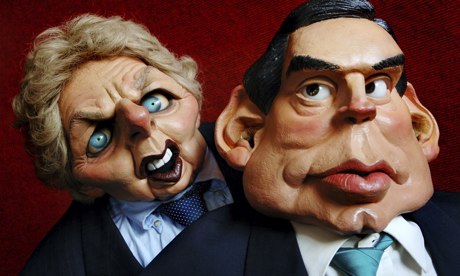
Fifty years ago, Stanley Kubrick co-wrote and directed the film Dr Strangelove. It's now a comedy classic, but it was adapted from a book called Red Alert by an RAF officer named Peter George – an entirely serious indictment of the supposedly failsafe systems designed to prevent nuclear war.
Kubrick was fascinated by nuclear conflict. But the more he read about the situation, the more he became convinced that a realistic treatment simply couldn't dramatise the absurdity of the situation: that each side possessed enough weaponry to destroy the world several times over; that winning a nuclear war was like winning a suicide race.
What emerged was not the serious drama that Peter George had intended, but a dark and brilliant comedy that still informs the way we look at global conflict. After all, it's not Dr Strangelove but his spiritual successor Donald Rumsfeld who complained: "Death has a tendency to encourage a depressing view of war."
We're hosting a special 50th anniversary screening of Dr Strangelove at this year's LOCO London Comedy Film Festival, as part of a focus on satire. But why celebrate satire, and why now?
Satire is all about puncturing power, and at a time when power – and the money that drives it – feels ever more concentrated in a few, largely corporate hands, it's more important than ever. TS Eliot wrote that "human kind cannot bear very much reality," while Freud said that jokes are a way of confronting our fears. Satire is where those two things come together. At its best – at its most honest – satire is a staring match with truth; it enables us to confront the things we fear, to look beyond the surface and to discover the often farcical truth underneath.
And that's where comedy comes in. Comedy has always been the British weapon: from Hogarth to Hislop, from Chaucer to Coogan, British artists, writers and performers have always punctured power by exposing its funny side, making laugh not war. Comedy is inherently democratic, welcoming in audiences who might otherwise shy away from addressing controversial subjects like religion (The Life Of Brian), politics (In The Loop, The Thick Of It) and even terrorism (Four Lions).
And far from blunting the edge of argument, comedy often sharpens it. As we've seen from Michael Gove's recent comments, Joan Littlewood's musical Oh! What a Lovely War is still busy making trouble more than 50 years after its first performance.
But is satire just a scream against a hurricane? Can it ever actually change anything? Spitting Image ran from 1984 to 1996, during which the Conservatives won two more election victories. And as the godfather of British satire, Peter Cook, said of his own satire club, The Establishment: "It's loosely based on the Berlin cabaret clubs of the 30s, which did so much to prevent the rise of Adolf Hitler."
I don't think that satire changes systems, but I do think it changes people. Reading, watching and studying satire – seeing the world from a satirical angle – makes us question what we consider "normal". It makes us look a little harder at the institutions, traditions and structures that we see around us every day, peeling away the emperor's clothes.
And that's why we're setting up LOCO's School of Satire, which will teach satirical thinking in schools. Children are exposed to thousands of commercial messages a year, many for soft drinks and fashion brands, but also for products aimed at adults like accident claims and payday loans. They see hundreds of hours of news, edited and scored to be as dramatic and emotive as possible. And they have perfectly reasonable fears – about death, family, school – that they often struggle to find language for.
Our school will help them to satirise the messages and marketing they see every day. We'll teach sketch-writing, stand-up and cartooning, creating a safe space to talk about the issues and ideas that worry them, and giving them a comic context – all the while, encouraging their critical thinking and firing their creativity.
Satire has been declared dead more often than Kenny in South Park, but it's in rude health in Britain right now: Bridget Christie is leading a generation of smart, funny feminist performers; writers Socrates Adams, Joe Stretch and Chris Killen are dissecting contemporary life with ghoulish delight, and director Ben Hopkins' Epic (2014) is a satirical look at the film business.
None of these is satire in the same way as Have I Got News For You, but then one of the best things about satire is that any institution can inspire it, and every artform can respond.
LOCO'S top 10 satirical comedies (in alphabetical order)
The Discreet Charm of the Bourgeoisie (Luis Bunuel, 1972)
Clueless (Amy Heckerling, 1995)
Daisies (Věra Chytilová, 1966)
Doomsdays (Eddie Mullins, 2013)
Dr Strangelove (Stanley Kubrick, 1964)
Four Lions (Chris Morris, 2010)
Modern Times (Charlie Chaplin, 1936)
Monty Python's Life of Brian (Terry Jones, 1979)
Team America: World Police (Trey Parker and Matt Stone, 2004)
To Be or Not to Be (Ernst Lubitsch, 1942)
Jonathan Wakeham is programmer of LOCO London Comedy Film Festival, which runs from 23 to 26 January – email hello@locofilmfestival.com to find out more
This content is brought to you by Guardian Professional. To get more articles like this direct to your inbox, sign up free to become a member of the Culture Professionals Network.

